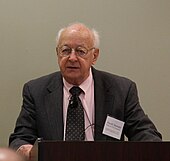Harold Demsetz
Harold Demsetz (born May 31, 1930 in Chicago , Illinois - † January 4, 2019 ) was an American economist assigned to the Chicago School .
In 1991 he was elected to the American Academy of Arts and Sciences .
Life
Demsetz formulated the so-called nirvana accusation (German also "nirvana" accusation ) against the comparison of realistic institutional arrangements with ideal, model institutions, such as the model of perfect competition or that of a welfare-maximizing state planner.
In addition, Demsetz laid the formal foundations for a temporary auction of natural monopolies in the regulation theory . His work can be seen as early approaches to the theory of contestable markets .
Demsetz has also investigated the change in property rights (see also the theory of rights of disposal ) over the course of history and came to the thesis: There is always a change in property rights when there is a change in the cost / benefit possibilities.
He modeled this using the example of the Labrador Indians . These had their traditional hunting grounds, which were not initially divided up. When the fur trade reached the island, the hunting grounds were divided up. Demsetz attributed this to the interest in further specification of the property rights . This arose because the high profit expectations for hunting fur animals led to the risk of overexploitation of common property. This danger has been countered by identifying individual property rights.
literature
- Harold Demsetz in: The Invisible Hand: Economic Thinking Yesterday and Today. by Ulrich Van Suntum , Springer Berlin Heidelberg, 2005, ISBN 978-3-642-16142-1 , page 51
Web links
- Harold Demsetz (English)
Individual evidence
- ^ Art Caden: In Memoriam: Harold Demsetz, 1930-2019. In: forbes.com . January 8, 2019 (obituary, English).
- ^ "Biography of Harold Demsetz in Pioneers of Industrial Organization: How the Economics of ...", by W. De Jong, William G. Shepherd, 2007, page 276
| personal data | |
|---|---|
| SURNAME | Demsetz, Harold |
| BRIEF DESCRIPTION | American economist |
| DATE OF BIRTH | May 31, 1930 |
| PLACE OF BIRTH | Chicago , Illinois , USA |
| DATE OF DEATH | 4th January 2019 |
